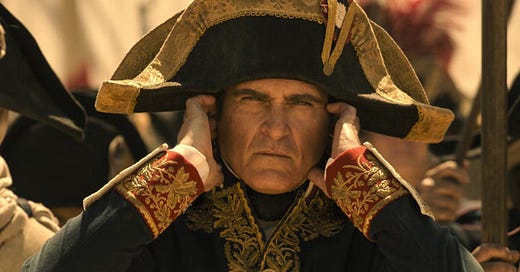Hello! First, look! A new format. My earlier newsletter portal, TinyLetter, has decided to close its doors, so I have shifted us all to Substack. Substack is the Spotify of newsletters in its outsize footprint, and I have valiantly (some would say foolishly) resisted switching to it. I enjoyed the smallness and ease of TinyLetter. But what to do? So now Movie! will have a new home at Substack and the shift should mean you are reading this in your inbox with no extra effort from your end.
A smallish review this week, for a big movie.
This week’s movie: Napoleon.
Ridley Scott’s Napoleon is a big, sweeping and sometimes plodding telling of the reign of Napoleon Bonaparte (Joaquin Phoenix). We follow the man who rose to be the self-crowned Emperor of France through his ascent through government, his various military campaigns and, significantly, his loving but frustrated marriage to Joséphine de Beauharnais (Vanessa Kirby).
Scott conducts his film in a grand, old-fashioned style: not for him the cross-cutting between timelines, or a speedy running time, or consistency in accents from non-French actors playing French people. Indeed, all the actors are generously allowed to keep their own accents, so that we have an American Napoleon and an English Joséphine. And Rupert Everett, a Brit playing a Brit (as the Duke of Wellington), affects the most impossibly posh of English accents, making regular old RP look like Cockney.
But the old-fashioned approach also means Scott gives us a thoroughly involving time. The film’s broad points come through strongly and there is a mild humour running like a current through several scenes. One editorial decision in particular made me laugh out loud. When Napoleon is introduced to the woman who will be his new wife, in hopes of bearing him a child (after Joséphine has been unsuccessful for fifteen years), he makes small talk before leaning forward and asking, ‘Would you like to see the bedroom?’ The film then immediately cuts to a nurse approaching Napoleon with a baby: ‘Your Majesty… your son!’
Other times, though, the film is a little too plain for its own good. The performances are solid but not particularly inspiring. Phoenix’s work has flashes of brilliance (such as in the scene where he movingly charms the French army onto his side after his escape from Elba), but is mostly respectable at best. Kirby is similar, giving Joséphine grace and heft, but unable to shake off the impression that she has played the part of the dignified, broken woman before (The Crown, Pieces of a Woman). And Scott’s this-happened-then-that-happened approach can get tedious. Several scenes possess a tangible rhythm and movement, particularly in the various battle sequences; yet there is constantly a feeling of having seen this kind of movie before and that feeling dents Napoleon’s impact.
Napoleon is in theatres.
Recommended reading:
The French appear particularly unhappy about Napoleon.



